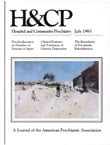Chronic Depression
Abstract
Objective: Chronic depression has not been appreciated or studied as well as episodic mood disorders or other chronic psychiatric disorders. This review provides an overview of the clinical features, biology, and treatment of chronic depression and suggests additional areas for research. Methods: The English-language literature was searched using MEDLINE. Additional references were selected from the bibliographies of recent publications. Studies of chronic nonbipolar depressed patients were selected; chronicity was defined as the persistence of depressive symptoms for at least two years or as a diagnosis of DSM-III or DSM-lll-R dysthymia, "double depression", or chronic major depression. Results and conclusions: Reported prevalence rates of chronic depression range from 3 to 5 percent in community samples and from 9 to 31 percent in clinical samples. Compared with patients with major depression, those with chronic depression have increased neurotic personality traits, adverse life events, health care utilization, and comorbid psychiatric and medical conditions, especially thyroid dysfunction. Bio-, logical and family studies support the relationship of chronic depression to the major mood disorders. Chronicity is also associated with inadequate treatment with antidepressant drugs. Serotonergic or monoamine oxidase inhibitors may be more effective in treating chronic depression than tricyclic antidepressants. Psychosocial therapies need further study but may be especially useful in combination with drug treatment. Future research should investigate the clinical and biological correlates of subtypes of chronic depression, the response of the subtypes to different antidepressants, and the relative efficacy of combined antidepressant-psychosocial treatment.
Access content
To read the fulltext, please use one of the options below to sign in or purchase access.- Personal login
- Institutional Login
- Sign in via OpenAthens
- Register for access
-
Please login/register if you wish to pair your device and check access availability.
Not a subscriber?
PsychiatryOnline subscription options offer access to the DSM-5 library, books, journals, CME, and patient resources. This all-in-one virtual library provides psychiatrists and mental health professionals with key resources for diagnosis, treatment, research, and professional development.
Need more help? PsychiatryOnline Customer Service may be reached by emailing [email protected] or by calling 800-368-5777 (in the U.S.) or 703-907-7322 (outside the U.S.).



